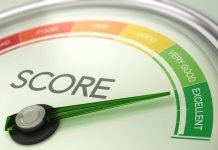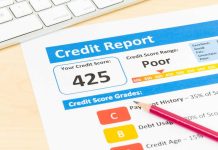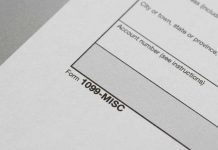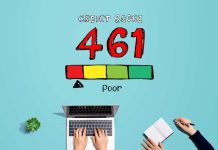
Handling your finances can be hard. If you don’t make enough money or don’t handle it the right way you can find your bills piling up with no way to handle your monthly payments. As your debt gets bigger, your accounts become past due, your credit score goes down, and you start getting calls from collection agencies, you can feel stuck between a rock and a hard place. Luckily, there may be more hope for your situation than you realize.
What is a Credit Score?
If you have a lot of unpaid debt that you don’t repay on time, you may notice your credit score decrease. It’s important to understand your score when figuring out the best way to handle your financial situation. Your score is a number usually between 300 to 850 that represents your creditworthiness to lenders. It shows lenders how you are as a borrower. Your score is calculated by credit bureaus based on information found on your credit report. A credit report has a variety of information about your credit history like available credit limit, current usage, late payments, etc. Not every credit bureau will have the same score for you because the information on your credit report may vary. You cannot get multiple free credit reports throughout the year. Instead, you can only get one free credit report annually. They base their scoring off scoring models like VantageScore and the FICO scoring model (but FICO is much more common).
Understanding Different Scores
There are different ranges of credit scores that fall into different categories depending on which scoring model you look at. For the FICO scoring model:
- Excellent: 800+
- Very Good: 740-799
- Good: 670-739
- Fair: 580-669
- Poor: <580
However the VantageScore model looks a little different:
- Excellent: 781+
- Good: 661-780
- Fair: 601-660
- Poor: 500-600
- Very Poor: <500
If your score is fair or below then lenders may view you as a subprime borrower. This means that you may be disqualified from being able to buy a home, get a car, qualify for a loan, etc. If you are still eligible with your score but it is lower than a good score you will still likely have higher interest rates compared to a borrower with a higher score.
What Factors Impact Your Credit Score?
In order to understand how your debt management impacts your score you will need to know what factors are important parts of calculating your score like:
- Payment History
- Credit Usage
- Credit Age
- Hard Inquiries
- Types of Credit
Payment History
Out of the list of factors that impact your score, payment history is at the top of the list. Your payment history accounts for 35% of your score. That’s why if you have late payments, collection accounts, etc., then you can see your score get lower.
Credit Usage
Also known as your credit utilization ratio, this factor accounts for 30% of your score. This factor looks at your credit limit compared to the amount of credit you’re using. For example, if your total credit limit between credit cards is $1,500 and you use a total of $700 then your credit utilization rate would be roughly 46%. If your credit card debt is to the limit then your ratio would be 100% or even more if you go over your limit.
Credit Age
The age of your credit accounts for 15% of your score. If you have multiple new credit accounts then your score may be lower compared to if you had multiple old credit accounts. A general rule of thumb is the older the account (with good repayment history) then the better the credit score.
Hard Inquiries
Tied at the bottom of the list of factors are hard inquiries which account for 10% of your score. There are two kinds of inquiries:
- Soft Inquiries
- Hard inquiries
Soft inquiries do not impact your score at all and are usually used as a way to pre-qualify a consumer. However, hard inquiries are a different story. Hard inquiries will need a written verification from the consumer to allow lenders to get an in-depth look at your credit history and better understanding of your score. Hard inquiries are the ones that impact your credit.
Types of Credit
The amount of credit diversity you have is another factor that will account for 10% of your score. There are two main types of credit which are installment loans and revolving credit. Installment loans would be like an auto loan used to buy a car while revolving credit would be a credit card. Another general rule of thumb is the more (healthy) credit diversity then the better the score. However, it’s not the most important thing so you shouldn’t go out of your way to get more diversity if you don’t have it.
How to Improve Your Current Financial Situation?
If you are in a situation where you find that you are struggling, there may be ways that you can regain control. Popular ways that people improve their financial situation include:
Credit Repair
Credit repair is an important part of handling your credit situation. However, if you have a lot of debt then credit repair may not be able to help. People can either handle credit repair on their own or with the help of a professional like a credit repair company.
If you want to handle credit repair on your own then you will need to start getting into some good habits. First you will want to repay your debts on time when they are due. If you cannot manage the full amount then you may want to talk to your lender about different repayment options. They may be more flexible than you realize. Other good habits include keeping your utilization rate below 30% (this means keeping your credit card debt low), not submitting many hard inquiries on your credit at once, disputing inaccurate information on your credit report, and more.
On the other hand, some people may try to get help from a credit repair company. These credit repair companies would review your credit report to find any inaccurate or unverifiable information that they can dispute for a fee. They would then dispute these items with the credit bureaus. If the credit bureaus are unable to verify the items within a 45 day time frame (however it’s generally within 30 days) then they will be dropped and the negative item will be removed from your account. Some of these items could be debts that you owed but if the debt rightfully belongs to you then they will not be able to get it removed.
Debt Consolidation
Another popular option that people consider to regain control of their financial situation is debt consolidation. Debt consolidation is the process of combining multiple debts into a single payment. This can help people better handle paying bills because they will only be responsible for a single payment compared to multiple different payments with multiple different interest rates. It’s also a helpful option for people who get confused with having multiple due dates.
People can consolidate debt using a debt consolidation loan. These loans are designed to repay your existing debt so that you would only be responsible for the one loan payment. There are a variety of lenders that you can choose from like your local financial institution, credit unions, online lenders, etc. You should speak to your banker to see if this is an option that you may be able to consider.
Credit Counseling
Credit counseling agencies are generally nonprofit and aim to help consumers better understand their financial situation. Consumers can explain their current situation and a licensed credit counselor will provide a plan of action. While they may not be able to erase your debts or improve your credit, credit counseling agencies can give you the education you need to handle your situation properly.
Debt Settlement
Debt Settlement is the process of paying a lump sum that is generally less than what you owe to settle your debt that you have with a creditor. Generally a third party debt settlement company will offer this option. They would be the ones to negotiate a debt settlement. However, this option can be risky and costly to your budget and your score. Individuals can also choose to handle this process on their own if they want!
Is a Debt Settlement Company Better Than Yourself?
There is no clear cut answer to this question. If you want to handle debt settlement yourself you can reach out to your lenders and ask to be put onto a debt settlement plan. Not every lender will accept this option but it’s worth a shot. Instead of doing that yourself you can let a debt settlement company do it for you so that you don’t have to deal with the process, effort, stress, etc. However, these companies can be costly.
If you choose to get debt settlement help from these kinds of debt settlement companies, the fee that you will need to pay is calculated as a percentage based on the amount of debt you have when you begin the debt settlement program (also known as enrolled debt). It is illegal for these companies to charge a fee until they settle your debt. On average, fees range between 20% to 25%.
Chapter 7 Bankruptcy
If all else fails and you are on your last resort, then you may want to consider Chapter 7 bankruptcy. We cannot stress enough that this should be your absolute last resort if every other option cannot help your situation. Also known as a liquidation bankruptcy or a straight bankruptcy, a Chapter 7 bankruptcy can clear away a bunch of different kinds of unsecured debt. This can provide consumers a fresh start but may involve repossession of your property and it will have a negative impact on your credit score for up to 10 years.
It is important to note that filing for a Chapter 7 bankruptcy isn’t just a walk in the park either. It is an extensive process that takes an average of months to resolve and involves the court system. Some people even get the help of a bankruptcy attorney just to make sure they handle the process in the best way possible.
Commonly Asked Questions
Handling your financial situation can be tricky and hard to understand. That is why you may have questions that others have had on their journey of improving their situation. Hopefully the answers to these questions may be able to provide some clarity.
Is Credit Counseling the Same as Credit Repair?
Sometimes consumers confuse credit counseling with credit repair since their names sound similar. However, they are different! Credit repair refers to the process of improving your credit score through a variety of different means.
Credit counseling is the process of providing information to consumers so they can become more educated about their financial situation. A credit counseling agency may be able to provide a plan of action to repair credit but they cannot do anything besides guide and teach consumers.
What’s the Difference Between Debt Consolidation and Debt Settlement?
Another two terms that people commonly confuse are debt consolidation and debt settlement. Debt consolidation is the process of taking multiple debts and rolling them into one debt. This is done typically through a debt consolidation loan. However, debt settlement is the process of settling debt typically for an amount less than what you owe. This can be done either on your own or with the help of a third party company.
Credit Repair vs Debt Consolidation: Which is Better?
The better option for you would be based on your current financial situation. If you have multiple lines of debt that you want to combine into one debt then debt consolidation would be the better choice. If you want to work on repairing your credit, you can do this through credit repair. Credit repair may involve debt consolidation but that’s not necessarily the case. You will want to talk to a professional like a credit counseling agency. You can look for a local credit counseling agency by searching online or talking to your bank.
Why is Your Credit Report Important to Your Credit Score?
Credit reports are a very important part of credit scores! Your credit score is calculated based on information found on your credit report. Your credit report contains information about your credit history. Items on your credit report will impact your score in different ways:
- Payment History (35%)
- Credit Usage (30%)
- Credit Age (15%)
- Hard Inquiries (10%)
- Types of Credit (10%)
Overall
If you are in a tough financial situation, you are not alone. There are ways that people can work on improving their current situation with ways like:
- Credit Repair
- Debt Consolidation
- Credit Counseling
- Debt Settlement
- Chapter 7 Bankruptcy
Each way will have its own set of pros and cons. The best option will vary based on your current situation. If you want to find out what the best option would be for what you’re dealing with then you should speak to a professional like a credit counselor at a credit counseling agency, your banker, etc. Even though your situation is stressful and feels hopeless, there may be more ways to fix it than you realize.
Article References
https://www.investopedia.com/terms/c/credit_score.asp
https://www.creditkarma.com/credit-scores
https://www.investopedia.com/terms/credit-repair.asp
https://www.nerdwallet.com/article/finance/consolidate-debt
https://www.consumerfinance.gov/ask-cfpb/what-is-credit-counseling-en-1451/
https://www.investopedia.com/personal-finance/debt-settlement-cheapest-way-get-out-debt/
https://www.experian.com/blogs/ask-experian/what-is-chapter-7-bankruptcy/
https://www.creditkarma.com/advice/i/credit-repair-companies
https://www.credit.com/credit-repair/




























